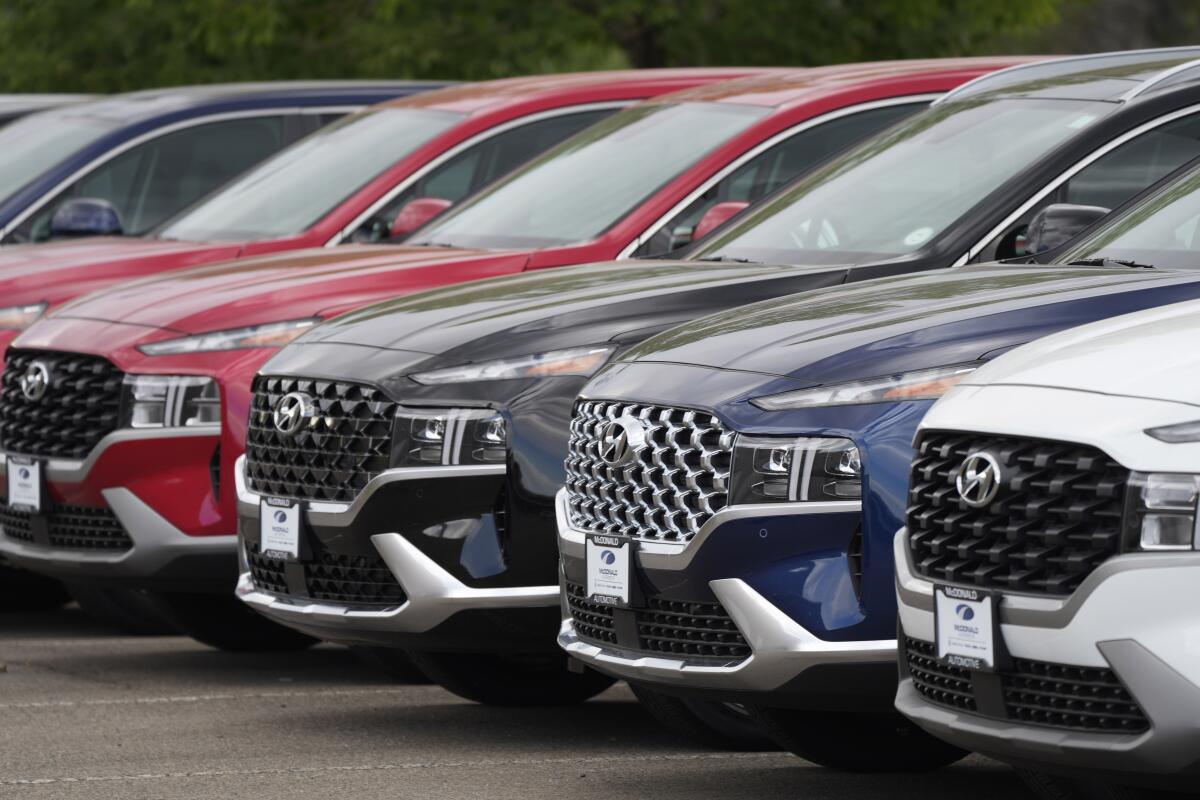Hyundai, Kia reach settlement on vehicles vulnerable to TikTok theft challenge

Two Korean auto manufacturers have reached a $200-million settlement in a class-action federal lawsuit alleging that a security loophole, which went viral on social media, left their vehicles vulnerable to theft, according to lawyers for the manufacturers and car owners.
Vehicles made by Hyundai Motor America and Kia America Inc. that did not have push-button ignitions became part of a TikTok challenge because they were more vulnerable to being hot-wired. Viral videos showed how Hyundai and Kia vehicles could be started using a common USB charging cord or a similar metal object.
The settlement extends to about 9 million people with Kia or Hyundai vehicles made between 2011 and 2022, the attorneys said Thursday in a news release for vehicle owners and manufacturers. The agreement is valued at up to $200 million, depending on the number of customers who file claims.
During the 11-year span, the automakers failed to equip cars with an immobilizer, an anti-theft tool that stops “most vehicles from being started unless a code is transmitted from the vehicle’s smart key,” according to the news release.
Relief to affected owners will come as soon as possible, said Steve Berman, managing partner at Hagens Berman and chair of the lead committee representing affected vehicle owners in the lawsuit.
“Our goal in finalizing this settlement was to leave no one in the dark,” Berman said. “The owners of these cars have experienced enough upset, and we worked to achieve a settlement that covers many types of losses — from those who were lucky enough to have never had their theft-prone car stolen, to those whose stolen cars were totaled completely due to Hyundai and Kia’s negligence.”
A new TikTok challenge is showing how to hot-wire cars. Kias and Hyundais are vulnerable, LAPD warns
LAPD officials say Kia and Hyundai vehicles made between 2010 and 2021 are manufactured in a way that makes them more susceptible to hot-wire, a shortcoming that has been exploited and shared on TikTok.
In a statement, Hyundai Chief Legal Officer Jason Erb said the settlement aims to curb the increased targeting of the vulnerable models.
“Customer security remains a top priority, and we’re committed to continuing software upgrade installations and steering wheel lock distribution to help prevent thefts,” Erb said.
James Bell, a Kia spokesperson, said in a statement that the company is committed to “working with law enforcement to combat car theft and the role social media plays in encouraging it.”
The settlement includes compensation of up to $145 million for out-of-pocket losses for affected vehicle owners. Owners can also be reimbursed for such expenses as towing costs; fees and taxes incurred if the affected car was lost or stolen, crashed or never recovered; and speeding tickets, red light tickets or other penalties or fines arising from a stolen vehicle.
Affected Kia and Hyundai owners are also eligible for a software upgrade to address the cars’ missing immobilizer, which includes more than a dozen Kia and Hyundai models. Owners whose cars are not compatible with the upgrade may instead receive up to $300 to install security features including a glass breakage alarm or an anti-theft system, steering wheel lock or other tools to prevent theft.
A settlement website for affected vehicle owners will soon go online, according to the news release.
TikTok videos about how the vehicles are stolen have gone viral on social media website in the past year or so.
Many local news outlets have covered the issue, citing the mostly anonymous “Kia Boys” as the culprits, especially in Milwaukee, where it appears the trend may have started or has become most widespread.
The Los Angeles Police Department said last year that Kia and Hyundai vehicles made up about 20% of stolen cars as of August 2022, likely because of the Tik Tok challenge.
Times staff writer Grace Toohey contributed to this report.








